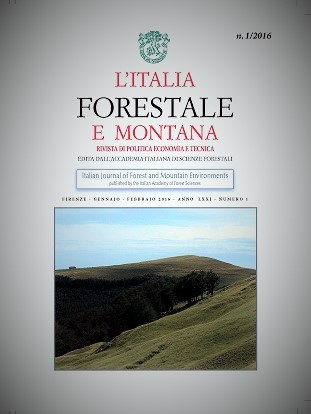Marginal fragmented beech stands and climate change in Sicily: effects of non-sustainable traditional silviculture practices in relation to micro-topographic gradient
Published 2016-05-10
Keywords
- marginal European beech,
- topographic gradient,
- coppice,
- tree damage,
- defoliation
- dead tree ...More
Copyright (c) 2016 Italian Journal of Forest and Mountain Environments

This work is licensed under a Creative Commons Attribution-NonCommercial 4.0 International License.
Abstract
In Sicily where the southernmost beech forests of Europe are located, beech stands show peculiar ecological, characters. The ecological marginality of these forests is particularly evident in the fragmented and isolated beech stands, near the timberline and/or located on less favourable topographic conditions. In this study we analyzed stand-structural parameters and tree health comparing recently coppice felled beech stands and control plots. Additionally, these aspects have been related also to the local topographic gradient and the cover fragmentation. Results clearly show a pronounced tree health reduction (more crown and bark damages, higher percentage of dead trees, lower seedling density) related to cut coppice, as far as to marginal topographic condition (on ridges and slopes) and stand-cover fragmentation (in clearing/border trees). The clear decreased tree health may lays an increasing future threat for these multi-marginal (for latitude, topography and cover fragmentation) beech stands. In addition, our results could also support the hypothesis that, although the silviculture effects originated by the human actions is quite evident in the two compared groups (coppice-cut and control), hastening the tree health reduction, a general climate change effect is going on these marginal beech stands. The reduced tree health status also in control plots seems to show this way.

